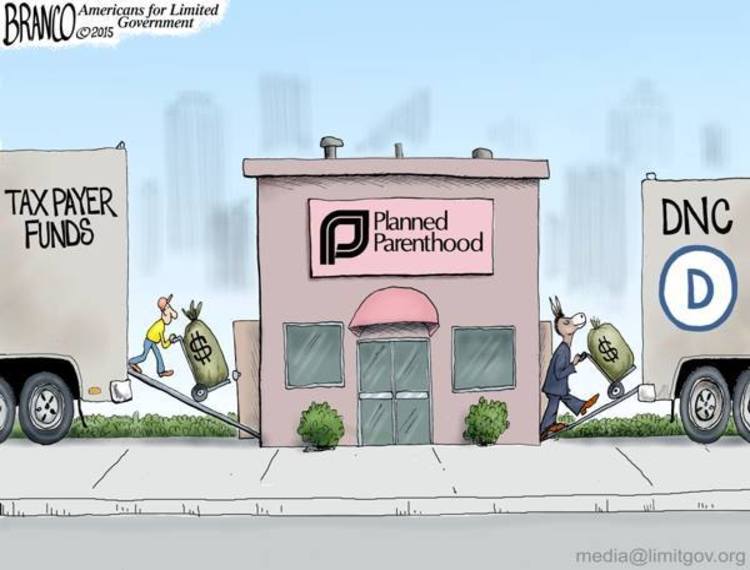Unlike most public policy, unfettered abortion was brought to life following a Supreme Court judgment call made by seven men in Roe v. Wade and Doe v. Bolton. Without the input of the executive or legislative branches of government, all of the nation’s abortion-related laws were wiped out with the judicial stroke of pen. But with the future of Roe in doubt, according to legal experts, reconsidering the assumptions that have been made about a billion-dollar abortion industry is timely.
Case in point, why should Planned Parenthood have a “get out of taxes free” card and avoid the financial realities that impact other businesses in America?
At the very least, Planned Parenthood and the nation’s abortion vendors should be taxed, just as cigarettes, alcohol and gambling are taxed, because of the high social costs of abortion for the women subjected to them.
Pregnancy is not a disease cured by abortion, and when it comes to actual health care, Planned Parenthood offers fewer services and none (except abortion) that are not widely available elsewhere. Planned Parenthood’s just released annual report for 2018-2019 shows that its abortion business is booming and that taxpayer support is at a record high at more than $616 million in 2018. Over the past 10 years, taxpayer support of Planned Parenthood has increased by almost 70%.
Women sold abortions have risks of bleeding and exposure to disease, as well as higher risks of mental health issues, higher rates of suicide, infections, further surgeries (including hysterectomies) and infertility. Breast cancer rates are higher for women whose first pregnancy ended in abortion. A taxed Planned Parenthood would result in redistributed funds needed to address the social fallout of abortion.
Taxes impact health care providers. For example, the National Conference of State Legislators notes that a “provider tax,” sometimes termed a “fee” or “assessment,” authorizes collecting revenue from specified categories of providers. “In most states, it is used as a mechanism to generate new in-state funds and match them with federal funds so that the state gets additional federal Medicaid dollars,” and as such it can generate billions, the organization reports. In fact, 49 states and the District of Columbia use such taxes. Only Alaska has refrained.
Operating with more than half-a-billion dollars in taxpayer funds and tax-free status gives Planned Parenthood incredible room to maneuver politically.
As reported at National Review, “Planned Parenthood’s PAC is among the most powerful lobbying groups in American politics, shelling out $40 million last year for “public policy” and investing upward of $175 million in such nebulous categories as “movement building,” “strengthening and securing Planned Parenthood,” and “engaging communities.”
Considering the level of activism subsidized on the taxpayers’ dime, requiring Planned Parenthood to contribute taxes is a natural step in addressing a billion-dollar industry that has been shown to negatively impact women.
SUPPORT LIFENEWS! If you like this pro-life article, please help LifeNews.com with a donation!
And frankly, taxing things – harmful or not – is a common cost of business and strongly advocated by the current crop of Democratic political hopefuls.
Sen. Elizabeth Warren want to tax “wealth.” Former New York Mayor Michael Bloomberg wants taxes on fuel and drinks with sugar. Anyone who has booked a hotel room in recent years has seen the fat “room tax” that municipalities add to a stay in a community. Consider that “the median state tax on cigarettes has increased more than fourfold — from 34 cents in 2000 to $1.57 in 2017,” according to a Pew study.
Industry by industry, economists can chart the impact of Uncle Sam taking a cut, and, in this presidential season, “at least seven Democratic presidential candidates have proposed raising the corporate income tax rate” just as a cost of doing business in the U.S., notes the Tax Foundation.
Why should the profitable abortion industry refuse to pay its fair share?
According to the National Council of Nonprofits, loss of tax exempt status is possible when an organization devotes “a substantial part of its activities to attempting to influence legislation,” “participate or intervene in any political campaign on behalf of, or in opposition to, any candidate for public office,” or “organized for or conduct activities that are illegal or violate fundamental public policies.”
Such as policies protecting women’s health and safety in health care settings, for example? In the case out of Louisiana coming to the Supreme Court in March, the justices will ponder the question of whether an abortion vendor should be able to ignore health and safety standards designed to protect women in real health care settings.
Even if abortion were in the Constitution – and it’s not – that still does not justify tax-free status or a right to ignore laws and regulations designed for public safety. A right to bear arms is in the Second Amendment but weapons are not sold tax-free or with taxpayer subsidies.
Planned Parenthood tries to have it both ways, dodging laws and costs by hiding behind the Constitution, but fundraising and engaging with the media in the name of health care.
Given how sharply divided the country is over abortion, common ground can be found in ending the special status Planned Parenthood has achieved through its political contacts and require it operate like the health care enterprise it claims to be.








